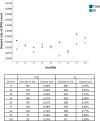Type of adjuvant endocrine therapy and disease-free survival in patients with early HR-positive/HER2-positive BC: analysis from the phase III randomized ShortHER trial
- PMID: 36739285
- PMCID: PMC9899279
- DOI: 10.1038/s41523-023-00509-2
Type of adjuvant endocrine therapy and disease-free survival in patients with early HR-positive/HER2-positive BC: analysis from the phase III randomized ShortHER trial
Erratum in
-
Author Correction: Type of adjuvant endocrine therapy and disease-free survival in patients with early HR-positive/HER2-positive BC: analysis from the phase III randomized ShortHER trial.NPJ Breast Cancer. 2023 Apr 12;9(1):24. doi: 10.1038/s41523-023-00532-3. NPJ Breast Cancer. 2023. PMID: 37045875 Free PMC article. No abstract available.
Abstract
The optimal adjuvant endocrine therapy for HR-positive/HER2-positive breast cancer patients is unknown. We included in this analysis 784 patients with HR-positive/HER2-positive BC from the randomized ShortHER trial of adjuvant trastuzumab (1 year vs 9 weeks) + chemotherapy. At a median follow-up of 8.7 years, patients who received AI had a significantly better DFS vs patients who received TAM or TAM-AI: 8-yr DFS 86.4 vs 79.7%, log-rank P = 0.013 (HR 1.52, 95% CI 1.09-2.11). In multivariate analysis, the type of endocrine therapy maintained a significant association with DFS (HR 1.64, 95% CI 1.07-2.52, p = 0.025 for TAM/TAM-AI vs AI). Among premenopausal patients aged ≤45 years, the use of GnRHa was associated with longer DFS: 8-yr DFS rate 85.2 vs 62.6% (log-rank p = 0.019, HR 0.41, 95% CI 0.19-0.88). In this post-hoc analysis of the ShortHER trial adjuvant treatment with AI was independently associated with improved DFS. Subgroup analysis in premenopausal patients suggests benefits with ovarian suppression.Trial registration: NCI ClinicalTrials.gov number: NCT00629278.
© 2023. The Author(s).
Conflict of interest statement
M.V.D. reports personal fees from Eli Lilly, Exact Sciences, Novartis, Pfizer, Seagen, Gilead, MSD, AstraZeneca, and Daiichi Sankyo outside the submitted work. A.F. reports personal fees from Roche, Novartis, Eli Lilly, AstraZeneca, Daiichi Sankyo, Seagen, and Gilead, outside the submitted work. P.C. reports personal fees from Novartis, Eli Lilly, AstraZeneca, Tesaro, Daiichi Sankyo, and Gilead, revealing Genomics, BMS, and Roche outside the submitted work. V.G. reports personal fees from Eli Lilly, Exact Sciences, Novartis, Pfizer, Gilead, MSD, Amgen, Sanofi, Merck Serono, and Eisai outside the submitted work. The remaining authors declare no competing interests.
Figures



References
Associated data
Grants and funding
LinkOut - more resources
Full Text Sources
Medical
Research Materials
Miscellaneous

